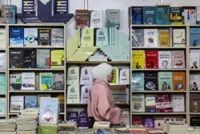Do you have books lying around at home, gathering dust? If so, why not donate them to a good cause?
Buku Beyond Bars, launched by the Malaysian Centre for Constitutionalism and Human Rights (MCCHR) in collaboration with the Anti-Death Penalty Asia Network (ADPAN) last year, is a community book drive that aims to expand the materials available in prison libraries.





